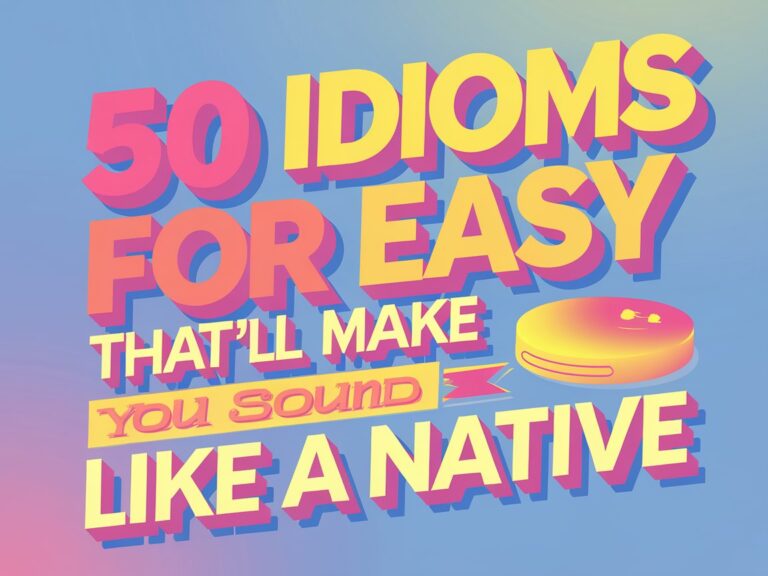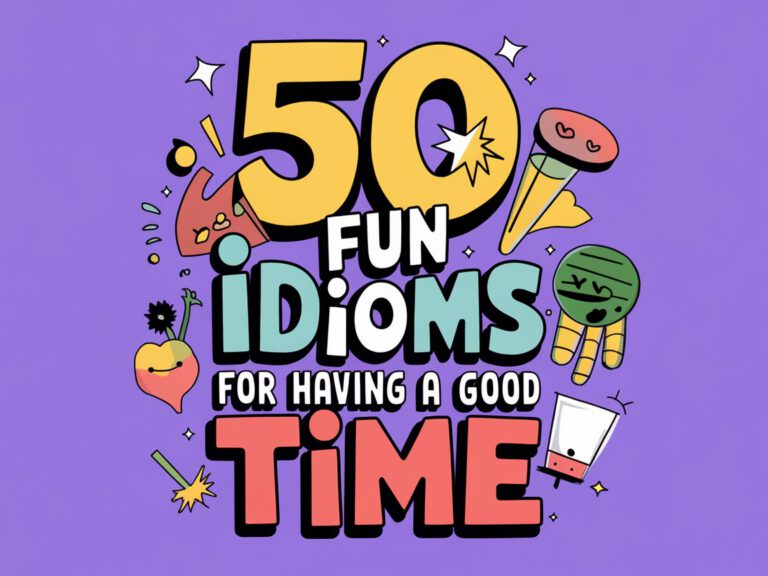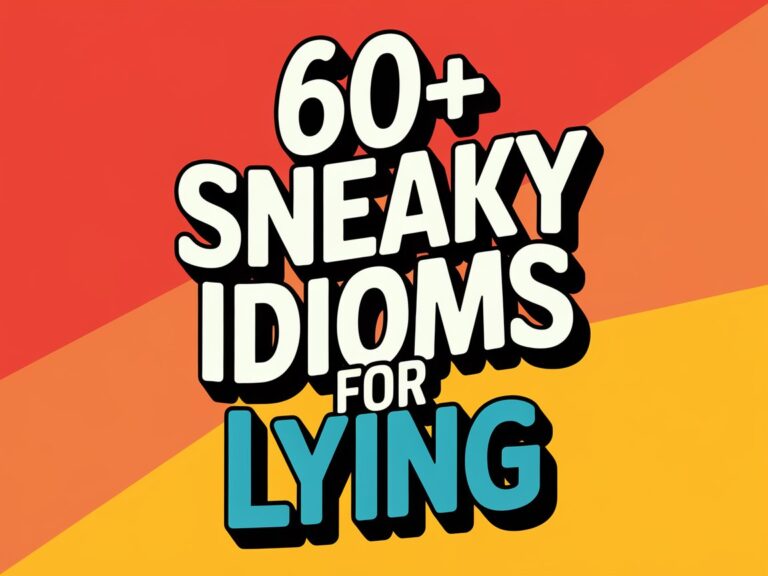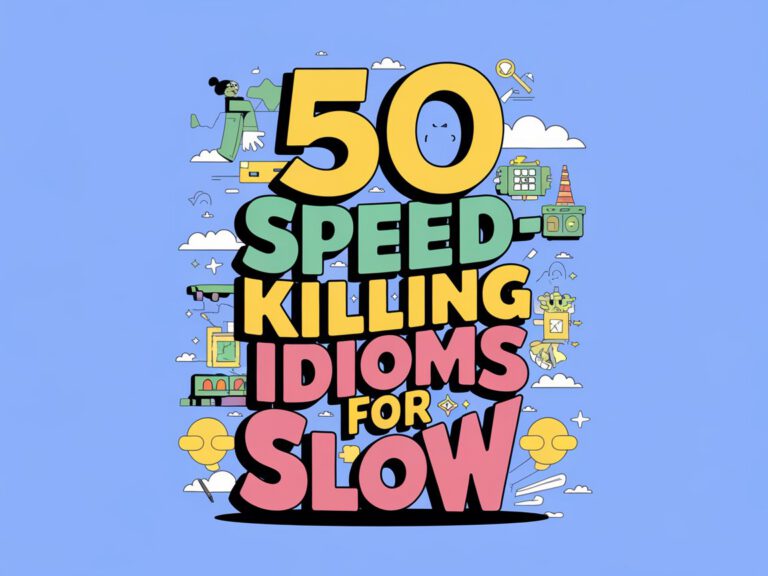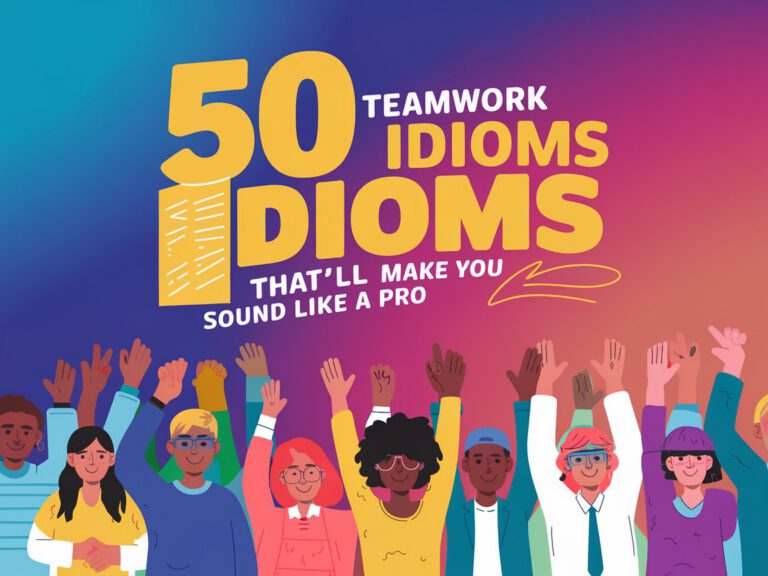50 Hilarious Idioms For Laughing That’ll Crack You Up
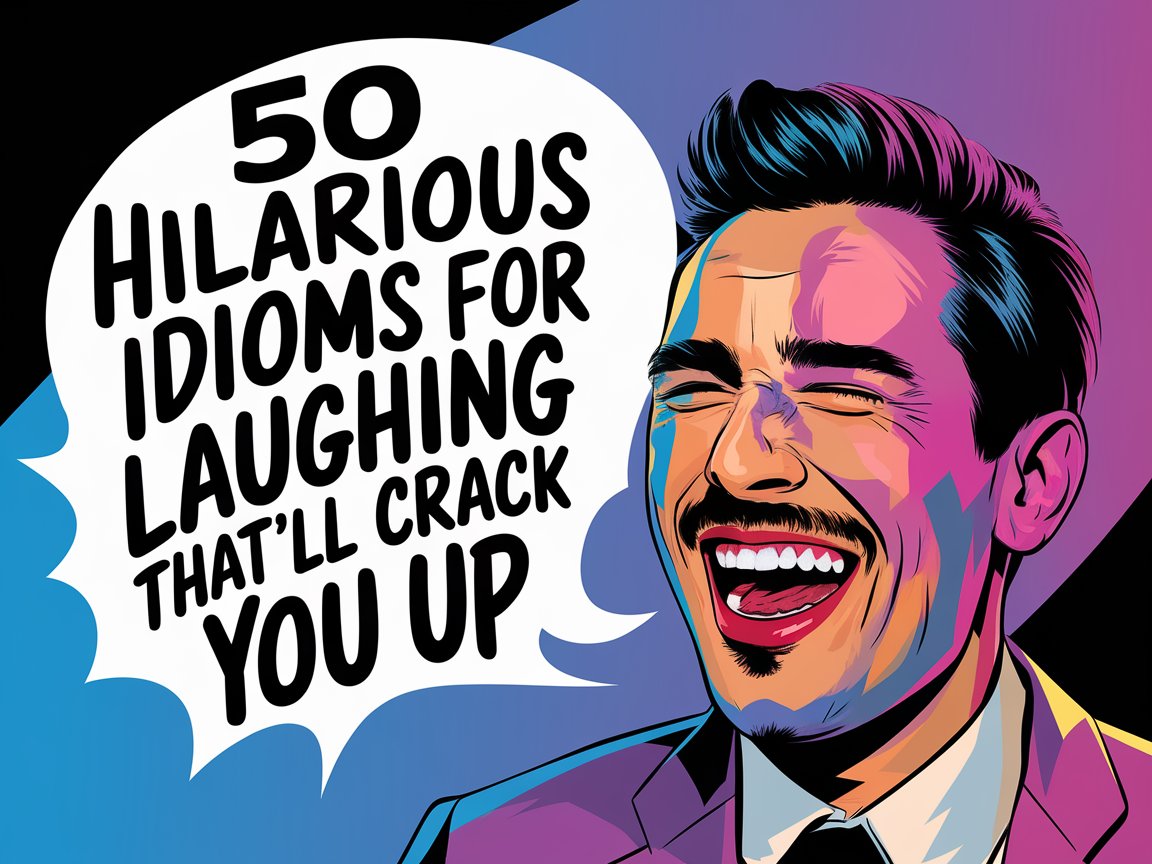
Idioms for laughing are some of the most colorful expressions in the English language. Whether you’re splitting your sides or rolling on the floor, these phrases capture every type of laughter from giggles to belly laughs. Understanding these expressions will help you speak more naturally and add humor to your conversations.
The Science Behind Laughter
Before we dive into these hilarious expressions, let’s look at what science says about laughter. Research shows that laughter produces significant health benefits beyond just making us feel good.
Physical Benefits of Laughter:
- Reduces cortisol (stress hormone) levels by 31.9%
- Increases stroke volume and cardiac output
- Triggers release of endorphins (natural painkillers)
- Improves blood flow and cardiovascular health
- Reduces blood pressure temporarily
Mental Health Benefits:
- Decreases anxiety and depression symptoms
- Promotes emotional resilience
- Enhances social connections
- Provides natural stress relief
| Laughter Type | Health Impact | Duration of Effect |
|---|---|---|
| Spontaneous | High cortisol reduction (43.9%) | 30-45 minutes |
| Self-induced | Moderate cortisol reduction | 15-30 minutes |
| Social | Enhanced bonding + stress relief | 1-2 hours |
Now let’s explore the 50 most popular idioms for laughing that you’ll hear in everyday conversation.
📊 Complete Laughing Idioms Reference Table
| Idiom 📝 ↕️ | Meaning 💭 ↕️ | Intensity Level 🌡️ ↕️ | Formality 👔 ↕️ |
|---|---|---|---|
| Laugh your head off | Laugh extremely hard and uncontrollably | HIGH | CASUAL |
| In stitches | Laughing so hard it physically hurts | HIGH | CASUAL |
| Chuckle to yourself | Quietly laughing to yourself | LOW | FORMAL |
| Burst into laughter | Suddenly start laughing loudly | MEDIUM | FORMAL |
| Rolling in the aisles | Laughing so much you feel like rolling on the floor | HIGH | CASUAL |
| Crack up | Suddenly start laughing a lot | MEDIUM | CASUAL |
💡 Pro tip: Click on any column header to sort the table!
1. Laugh Your Head Off
This idiom means to laugh extremely hard and uncontrollably. When someone says they “laughed their head off,” they’re describing intense, unrestrained laughter.
Example: “We laughed our heads off at the comedy show last night.”
The phrase creates a vivid image of laughing so hard your head might actually fall off. It’s perfect for describing those moments when something is absolutely hilarious.
Pro tip: Use this idiom when you want to emphasize just how funny something was to you.
2. In Stitches
Being “in stitches” means laughing so hard it physically hurts. The expression comes from the idea that you’re laughing so much, you feel like you need to be stitched back together.
Example: “That movie had us in stitches the whole time.”
This idiom perfectly captures that feeling when your stomach muscles actually ache from laughing too much. It’s one of the most commonly used expressions for intense laughter.
3. Burst Into Laughter
To “burst into laughter” means to suddenly start laughing loudly. It describes that moment when something catches you off guard and you can’t help but laugh immediately.
Example: “When the clown slipped on the banana peel, the audience burst into laughter.”
This phrase emphasizes the sudden, explosive nature of the laughter. It’s like a balloon popping – quick and unexpected.
4. Split Your Sides
“Splitting your sides” means laughing so hard it feels like your sides might burst. This idiom refers to that intense physical sensation of laughing until your abdominal muscles hurt.
Example: “We split our sides laughing at the blooper reel.”
The expression creates a dramatic image of laughter being so intense it could literally split you open. It’s perfect for describing really intense funny moments.
5. Die Laughing
“Dying laughing” means laughing so much it feels overwhelming. This is hyperbole at its finest – you’re not actually dying, but the laughter feels that intense.
Example: “We were dying laughing at the comedy show.”
This idiom emphasizes just how funny something was. It’s like saying the humor was so good, it nearly killed you with laughter.
6. Roll in the Aisles
To “roll in the aisles” means laughing so much you feel like rolling on the floor. This expression comes from theater audiences laughing so hard they’d practically roll in the theater aisles.
Example: “The audience was rolling in the aisles during the play.”
This idiom suggests infectious, communal laughter that spreads throughout a group. It’s perfect for describing audience reactions to really funny performances.
7. Crack Up
“Cracking up” means to suddenly start laughing a lot. It describes that moment when something unexpectedly funny makes you lose control and start laughing.
Example: “We cracked up at his ridiculous dance moves.”
The phrase suggests that the humor “cracked” your serious exterior, letting the laughter burst through. It’s casual and commonly used in everyday conversation.
8. Roar With Laughter
“Roaring with laughter” means laughing so loudly it sounds like a lion’s roar. This idiom emphasizes the volume and power of the laughter.
Example: “The audience roared with laughter throughout the show.”
This expression is perfect for describing loud, communal laughter that fills a room. It suggests the laughter is both powerful and infectious.
9. Have a Good Belly Laugh
A “belly laugh” is a hearty, genuine laugh that comes from deep inside. It’s the kind of laughter that engages your whole body, especially your diaphragm.
Example: “Sometimes, all you need is a good belly laugh to relieve stress.”
This idiom emphasizes the physical nature of deep, satisfying laughter. It’s the opposite of polite, restrained chuckling.
10. Laugh Until Your Sides Hurt
This expression means laughing so much that your abdominal muscles become sore. It describes the physical aftermath of intense laughter.
Example: “We laughed until our sides hurt at the family reunion.”
The phrase captures that bittersweet moment when something is so funny it literally causes physical discomfort. It’s a badge of honor for a truly hilarious experience.
11. Burst Out Laughing
“Bursting out laughing” means starting to laugh suddenly and uncontrollably. It’s similar to “burst into laughter” but emphasizes the outward explosion of the sound.
Example: “When the clown slipped, the children burst out laughing.”
This idiom captures the spontaneous nature of genuine humor. It’s like laughter bursting out of you before you can stop it.
12. Laugh Like a Hyena
“Laughing like a hyena” means laughing loudly and uncontrollably. Hyenas are known for their distinctive, wild-sounding “laughter,” so this comparison emphasizes unrestrained, almost animalistic laughter.
Example: “During the comedy show, everyone was laughing like hyenas.”
This idiom suggests laughter that’s a bit wild and uninhibited. It’s perfect for describing really raucous, uncontrolled laughter.
13. Giggle Like a Schoolgirl
“Giggling like a schoolgirl” means laughing in a lighthearted, innocent way. This expression suggests playful, carefree laughter.
Example: “They giggled like schoolgirls at the inside joke.”
The idiom evokes youthful, pure joy. It’s often used to describe adults who are laughing in a particularly carefree or silly way.
14. Double Over With Laughter
“Doubling over with laughter” means laughing so hard you bend forward. This describes the physical posture of someone laughing intensely.
Example: “They doubled over with laughter at the comedian’s jokes.”
This idiom captures the way intense laughter can literally change your posture. Your body folds in on itself from the force of the laughter.
15. Laugh All the Way to the Bank
“Laughing all the way to the bank” means being very happy about making money. This isn’t about humorous laughter – it’s about the satisfaction of financial success.
Example: “After winning the lottery, Sarah was laughing all the way to the bank.”
This expression suggests that someone is so pleased with their financial gain, they’re practically laughing with joy about it.
16. Cackle Like a Witch
“Cackling like a witch” means laughing in a high-pitched, sharp way. This suggests mischievous or slightly sinister laughter.
Example: “She cackled like a witch after pulling off the prank.”
The idiom evokes the stereotypical witch’s laugh from fairy tales. It suggests laughter with a hint of mischief or wickedness.
17. Have the Last Laugh
“Having the last laugh” means ultimately being successful after being doubted. It’s about vindication and proving doubters wrong.
Example: “Everyone laughed at his startup, but he had the last laugh.”
This idiom isn’t about the act of laughing but about the satisfaction of proving people wrong. It suggests triumph over skepticism.
18. Laugh Up Your Sleeve
“Laughing up your sleeve” means secretly finding something amusing. You’re hiding your amusement while pretending to be serious.
Example: “Even though she was scolding him, he was secretly laughing up his sleeve.”
This expression suggests suppressed or hidden laughter. It’s perfect for describing situations where you find something funny but can’t show it openly.
19. Chuckle to Yourself
“Chuckling to yourself” means quietly laughing to yourself. It’s gentle, private amusement over something mildly funny.
Example: “He chuckled to himself while reading the comic.”
This idiom describes quiet, personal laughter. It’s the kind of gentle amusement you might feel when remembering something funny.
20. Snicker Under Your Breath
“Snickering under your breath” means laughing quietly or secretly. It suggests hidden amusement, often at something inappropriate.
Example: “They snickered under their breath at the teacher’s mistake.”
This expression implies laughter that’s meant to be concealed. It often suggests finding humor in situations where laughter might not be appropriate.
21. Laugh Like a Drain
“Laughing like a drain” means laughing loudly and uproariously. This British expression compares loud laughter to the sound water makes going down a drain.
Example: “The audience was laughing like a drain at the comedian’s jokes.”
This idiom emphasizes the volume and continuous nature of the laughter. It suggests laughter that just keeps flowing.
22. Get the Giggles
“Getting the giggles” means starting to giggle uncontrollably. It’s often used for those moments when you can’t stop laughing, even when you should be serious.
Example: “They got the giggles during the serious meeting.”
This phrase captures that feeling when laughter becomes uncontrollable, often at inappropriate moments. It’s like the giggles have taken over.
23. Tickled Pink
Being “tickled pink” means feeling very pleased or delighted. While not about laughing per se, it’s related to the kind of joy that makes you want to laugh.
Example: “She was tickled pink by the surprise party.”
This idiom suggests such delight that your cheeks turn pink, as if someone were tickling you. It’s about pure, happy satisfaction.
24. Laugh It Off
“Laughing it off” means dismissing a problem by laughing. It’s about using humor to deal with embarrassment or difficulty.
Example: “She tripped but laughed it off gracefully.”
This expression shows how laughter can be used as a coping mechanism. It suggests resilience and the ability to find humor in setbacks.
25. Lose It
“Losing it” means becoming unable to control your laughter. It’s that moment when something is so funny you completely lose composure.
Example: “He completely lost it when he saw the video.”
This idiom suggests that laughter has taken over completely. You’ve “lost” your ability to remain composed.
26. Be a Barrel of Laughs
Being “a barrel of laughs” means being very funny or entertaining. This describes a person who consistently makes others laugh.
Example: “He’s a barrel of laughs at parties.”
The phrase suggests someone who’s like a container full of laughter – they bring humor wherever they go.
27. Laugh Fit to Burst
“Laughing fit to burst” means laughing very hard, almost to the point of exploding. It emphasizes the intensity of the laughter.
Example: “The joke was so funny that Jack was laughing fit to burst.”
This expression creates an image of laughter so intense it might make you explode. It’s about reaching the absolute limit of how hard you can laugh.
28. Have a Laughing Fit
Having “a laughing fit” means an uncontrollable outburst of laughter. It’s when laughter takes over and you can’t stop.
Example: “During the presentation, Sarah had a laughing fit when her friend made a funny face.”
This idiom treats laughter like a medical episode – something that happens to you rather than something you choose to do.
29. Laugh Your Socks Off
“Laughing your socks off” means laughing a lot. It’s a playful variation on “laugh your head off” that suggests laughter so intense it could knock your socks off.
Example: “I laughed my socks off watching that sketch.”
This expression is casual and fun. It suggests laughter that’s both intense and enjoyable.
30. Force a Laugh
“Forcing a laugh” means pretending to laugh to be polite. This is about fake laughter rather than genuine amusement.
Example: “She forced a laugh at his not-so-funny joke.”
This idiom acknowledges that not all laughter is genuine. Sometimes we laugh out of social obligation rather than real humor.
31. Laugh Out Loud
“Laughing out loud” (often abbreviated as LOL) means laughing audibly rather than just internally. It emphasizes that the laughter is vocal and obvious.
Example: “That meme made me literally laugh out loud.”
This phrase distinguishes between internal amusement and actual vocal laughter. In our digital age, it’s become one of the most recognized expressions.
32. Laugh Till You Cry
“Laughing till you cry” means laughing so hard that tears form. It’s about laughter so intense it triggers a physical response.
Example: “That story had us laughing till we cried.”
This idiom captures the paradox of extreme joy causing tears. It’s about laughter that’s so intense it crosses over into crying.
33. Titter Nervously
“Tittering nervously” means laughing in a short, high-pitched way due to discomfort. This isn’t joyful laughter but anxious laughter.
Example: “She tittered nervously during the awkward conversation.”
This expression describes laughter that comes from nervousness rather than humor. It’s a defense mechanism in uncomfortable situations.
34. Laugh Like There’s No Tomorrow
“Laughing like there’s no tomorrow” means laughing with complete abandon. It suggests throwing caution to the wind and laughing without restraint.
Example: “At the carnival, the children were laughing like there’s no tomorrow.”
This idiom emphasizes freedom and intensity. It’s about laughing as if this might be your last chance to do so.
35. Splitting My Sides With Laughter
“Splitting my sides with laughter” means laughing so hard your sides ache. It’s similar to other “splitting” expressions but emphasizes the physical sensation.
Example: “The comedy movie had everyone splitting their sides with laughter.”
This phrase captures the physical intensity of hard laughter. It suggests laughter that literally affects your body.
36. Laugh in Someone’s Face
“Laughing in someone’s face” means openly and disrespectfully laughing at someone. This isn’t friendly laughter but mocking behavior.
Example: “It’s not polite to laugh in someone’s face when they’re sharing feelings.”
This expression describes cruel or dismissive laughter. It’s about using laughter as a weapon rather than sharing joy.
37. Have a Laugh at Someone’s Expense
“Having a laugh at someone’s expense” means joking about someone’s misfortune. This is laughter that comes at the cost of someone else’s dignity.
Example: “It’s not right to have a laugh at someone’s expense.”
This idiom acknowledges that not all laughter is kind. Sometimes humor can be hurtful when it targets others.
38. Laugh Up a Storm
“Laughing up a storm” means laughing very loudly and energetically. It compares intense laughter to a powerful weather event.
Example: “At the sleepover, the kids were laughing up a storm while watching videos.”
This expression suggests laughter that’s both powerful and sustained, like a storm that goes on and on.
39. Laugh on the Other Side of Your Face
“Laughing on the other side of your face” means being forced to stop laughing when things go wrong. It’s about having your joy turn to disappointment.
Example: “He’ll be laughing on the other side of his face when he sees the bill.”
This idiom suggests that current amusement will soon turn to regret or unhappiness. It’s a warning that the laughter won’t last.
40. A Laughingstock
Being “a laughingstock” means being someone that others ridicule. You become the target of others’ laughter rather than sharing in it.
Example: “After that mistake, he became the office laughingstock.”
This expression describes the unfortunate position of being laughed at rather than laughed with. It’s about becoming an object of mockery.
41. Make Someone Laugh
“Making someone laugh” means causing someone to laugh through humor. It’s about being the source of others’ laughter and joy.
Example: “He always knows how to make me laugh when I’m down.”
This simple idiom captures the gift of bringing laughter to others. It’s about spreading joy through humor.
42. Laugh Someone Out of Court
“Laughing someone out of court” means dismissing someone’s ideas as ridiculous. It’s about using mockery to reject something completely.
Example: “His theory was laughed out of court by the experts.”
This expression suggests that an idea is so bad it doesn’t deserve serious consideration. The laughter is dismissive rather than joyful.
43. Not Know Whether to Laugh or Cry
“Not knowing whether to laugh or cry” means being confused about whether to be amused or upset. It’s about situations that are both funny and sad.
Example: “When the cake fell, I didn’t know whether to laugh or cry.”
This idiom captures those moments when something is simultaneously tragic and comedic. It’s about mixed emotions.
44. Raise a Laugh
“Raising a laugh” means making someone smile or feel happier. It’s about lifting someone’s spirits through humor.
Example: “His funny text raised a smile on her face.”
This expression suggests that laughter can be cultivated or encouraged. It’s about the deliberate act of creating joy.
45. Laugh Your Way Through Something
“Laughing your way through something” means staying cheerful during difficulty. It’s about using humor as a coping strategy.
Example: “They laughed their way through the whole road trip.”
This idiom shows how laughter can make challenging situations more bearable. It’s about maintaining positivity through humor.
46. A Hearty Laugh
“A hearty laugh” means a loud, genuine laugh. It emphasizes the authentic and robust nature of the laughter.
Example: “Grandpa let out a hearty laugh at the joke.”
This expression describes laughter that’s both genuine and vigorous. It suggests someone really enjoyed the humor.
47. Laugh Someone to Scorn
“Laughing someone to scorn” means ridiculing someone contemptuously. This is about using laughter as a form of rejection or dismissal.
Example: “The critics laughed the new artist to scorn.”
This idiom describes harsh, dismissive laughter that’s meant to hurt or humiliate. It’s laughter used as a weapon.
48. Be All Smiles and Laughter
Being “all smiles and laughter” means being very cheerful and happy. It describes someone in a consistently good mood.
Example: “They were all smiles and laughter at the wedding.”
This expression paints a picture of pure joy and happiness. It’s about radiating positivity and mirth.
49. Lighten the Mood
“Lightening the mood” means making a serious atmosphere more cheerful using humor. It’s about using laughter to change the emotional tone of a situation.
Example: “She told a funny story to lighten the mood.”
This idiom shows how humor can be used strategically to improve situations. Laughter becomes a tool for social harmony.
50. Laugh Out of the Blue
“Laughing out of the blue” means laughing suddenly and unexpectedly. It describes laughter that comes from nowhere, often surprising others.
Example: “He laughed out of the blue during the quiet dinner.”
This expression captures those moments when something strikes you as funny unexpectedly. The laughter appears without warning.
Frequently Asked Questions
Q: What’s the difference between “laugh your head off” and “split your sides”?
A: Both describe intense laughter, but “laugh your head off” emphasizes the uncontrollable nature, while “split your sides” focuses on the physical sensation of abdominal muscles hurting from laughing.
Q: Are idioms like “laugh like a hyena” considered offensive?
A: Not typically. These animal comparisons are generally accepted as colorful expressions. However, context matters – using them to mock someone specifically could be hurtful.
Q: Can I use these idioms in formal writing?
A: Most laughing idioms are casual expressions best suited for informal writing. In formal contexts, stick to simpler phrases like “found it amusing” or “laughed heartily.”
Q: What’s the most commonly used laughing idiom?
A: “Laugh out loud” (LOL) is probably the most recognized today, especially in digital communication. “Crack up” and “burst out laughing” are also very common in everyday speech.
Q: Do other languages have similar laughing idioms?
A: Yes! Most languages have colorful expressions for laughter. For example, Spanish has “morirse de risa” (dying of laughter), and French has “rire aux éclats” (laughing in bursts).
Conclusion
These 50 idioms for laughing show just how important humor is in human communication. From gentle chuckles to side-splitting guffaws, we have dozens of ways to describe the many faces of laughter.
But here’s something fascinating that most people don’t realize: using these idioms actually makes you funnier. When you describe laughter with vivid expressions like “rolling in the aisles” or “laughing like there’s no tomorrow,” you’re not just reporting what happened – you’re recreating the humor for your listener.
Studies show that people who use colorful language and idioms are perceived as more engaging and entertaining. So the next time you want to share a funny story, don’t just say “it was funny.” Say you “laughed your head off” or were “in stitches.” Your audience will feel like they’re part of the experience.
Remember, laughter truly is the best medicine. Whether you’re giggling like a schoolgirl or roaring with laughter, you’re not just having fun – you’re boosting your health, reducing stress, and connecting with others. So go ahead, laugh it up! Your body and mind will thank you for it.
Helpful Resources
- https://pmc.ncbi.nlm.nih.gov/articles/PMC6125057/
- https://pmc.ncbi.nlm.nih.gov/articles/PMC10204943/
- https://www.unthsc.edu/college-of-public-health/why-laughter-is-the-best-medicine-for-your-whole-health/
- https://atlas.chiro.org/2013/12/a-review-of-the-beneficial-and-harmful-effects-of-laughter/
- https://idiomandmetaphor.com/idioms-for-laughing/
- https://idiominsider.com/idioms-for-laughing/
- https://english22.com/en/laugh-idioms/
- https://idioms.thefreedictionary.com/laughing
- https://www.grammarly.com/blog/idioms/knowledge-is-power-using-idioms-to-give-power-to-your-writing/

